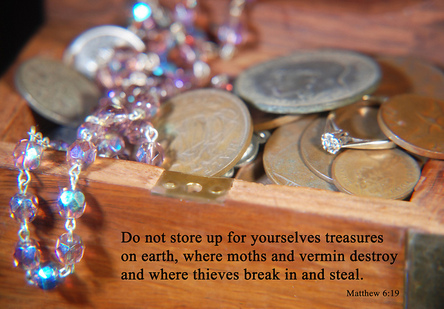
There are some key words that have been widely mistaught in church over the centuries. Today, we will look at the words lost, perish, and destroy.
The concept 'destruction', 'destroy', or 'perish' are key terms in the Bible used to support the teaching of either annihilation or the concept of eternal conscious torment. The terms 'destruction', 'destroy', or 'perish' lead to many differences of opinion. Most of the conclusions are not Scripturally based.
How do we come up with the actual definition of a word
in the Bible? Well, many theologians say that the first occurrence of a word in the Scriptures reveals its meaning. But it is certainly a "reach" to suggest that the first occurrence of a word gives its primary meaning, since it is not known exactly when the Gospels were written. Matthew is thought to have been written around A.D. 50; Mark, the date is not known; Luke was thought to have been written in A.D. 59 to 63, and the Gospel of John, for a long time was assumed to have been written in the A.D. 70's, but it probably was written closer to the A.D. 50's. Paul wrote Romans around A.D. 57, and yet all of these dates are estimations. So just looking at the "first instance" of a word in the Bible does not mean that was the first instance it was used chronologically. Therefore, the "first" occurrence of the word is not necessarily its "primary" meaning.
The only sound system of determining the "primary" or essential meaning of any word is to gather all of its
occurrences in the Bible, and to make certain that its meaning never contradicts any of the contexts in which it is used.
As we study the word 'apollumi' in the Greek Scriptures, it is often translated 'destroy', 'perish' or 'lost' describing the wicked. Does this word apollumi really mean 'to deprive of life' for eternity (without end)? Let's allow the Bible to interpret itself and give us the true meaning of 'apollumi'.
The concept 'destruction', 'destroy', or 'perish' are key terms in the Bible used to support the teaching of either annihilation or the concept of eternal conscious torment. The terms 'destruction', 'destroy', or 'perish' lead to many differences of opinion. Most of the conclusions are not Scripturally based.
How do we come up with the actual definition of a word
in the Bible? Well, many theologians say that the first occurrence of a word in the Scriptures reveals its meaning. But it is certainly a "reach" to suggest that the first occurrence of a word gives its primary meaning, since it is not known exactly when the Gospels were written. Matthew is thought to have been written around A.D. 50; Mark, the date is not known; Luke was thought to have been written in A.D. 59 to 63, and the Gospel of John, for a long time was assumed to have been written in the A.D. 70's, but it probably was written closer to the A.D. 50's. Paul wrote Romans around A.D. 57, and yet all of these dates are estimations. So just looking at the "first instance" of a word in the Bible does not mean that was the first instance it was used chronologically. Therefore, the "first" occurrence of the word is not necessarily its "primary" meaning.
The only sound system of determining the "primary" or essential meaning of any word is to gather all of its
occurrences in the Bible, and to make certain that its meaning never contradicts any of the contexts in which it is used.
As we study the word 'apollumi' in the Greek Scriptures, it is often translated 'destroy', 'perish' or 'lost' describing the wicked. Does this word apollumi really mean 'to deprive of life' for eternity (without end)? Let's allow the Bible to interpret itself and give us the true meaning of 'apollumi'.
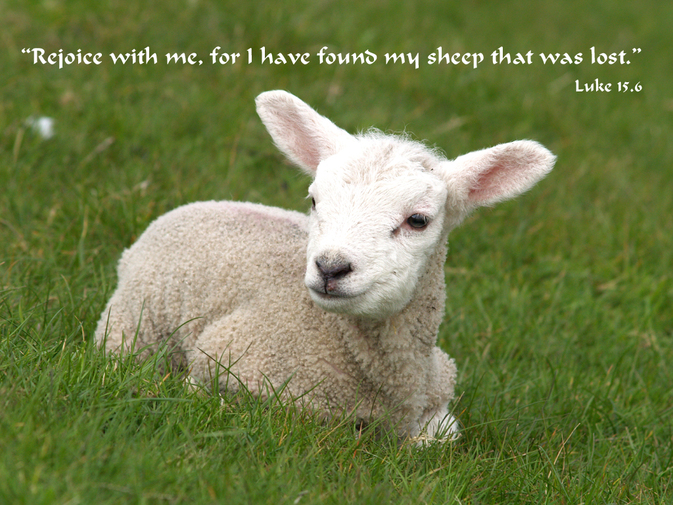
Sometimes apollumi is translated 'lost' such as in the 'lost' sheep, while the sheep remained alive. In other places, the same word, 'apollumi', is translated 'perish' or 'destroyed' and the implication in these last two instances is that the individual is dead.
But the same word, 'apollumi', CANNOT mean 'to be
alive' in some instances AND 'to be dead" in other instances. In other words, the same word cannot mean both 'death' and 'life'.
But the same word, 'apollumi', CANNOT mean 'to be
alive' in some instances AND 'to be dead" in other instances. In other words, the same word cannot mean both 'death' and 'life'.
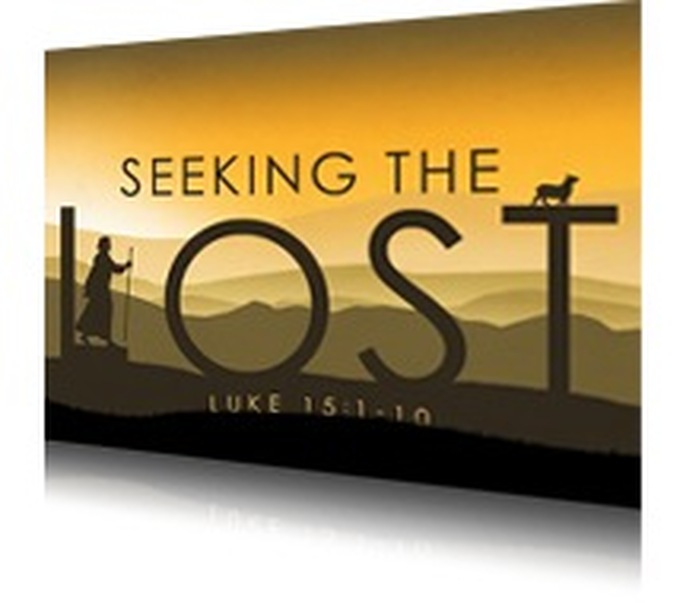
The Greek word, apollumi (#622 below), is often translated 'lost', when the 'lost' item was subsequently 'found' such as in the parable of the 'lost' sheep (Luke 15:6), the 'lost' coin (Luke 15:9), and the 'lost' son (prodigal son in Luke 15:32).
In NO instance had the sheep, the coin or the prodigal son died. And of course, the coin NEVER HAD life. Therefore, the word apollumi CANNOT mean 'to deprive of life'.
These three parables all reveal what was once (apollumi) is now found. They are examples of restoration not destruction.
Luke 15:6, "And when he comes home, he calls together with his friends and his neighbors, saying to them, 'Rejoice with me, for I have found my sheep which was lost (apollumi)!'
Luke 15:9, "When she has found it, she calls together her friends and neighbors, saying, 'Rejoice with me, for I have found the coin which I had lost (apollumi)!'
Luke 15:31-32, "And he said to him, 'Son, you have always been with me, and all that is mine is yours. But we had to celebrate and rejoice, for this brother of yours was dead and has begun to live, and was lost (apollumi) and has been found.'
Luke 19:10, "For the Son of Man has come to seek and to save that which was lost (apollumi)."
In NO instance had the sheep, the coin or the prodigal son died. And of course, the coin NEVER HAD life. Therefore, the word apollumi CANNOT mean 'to deprive of life'.
These three parables all reveal what was once (apollumi) is now found. They are examples of restoration not destruction.
Luke 15:6, "And when he comes home, he calls together with his friends and his neighbors, saying to them, 'Rejoice with me, for I have found my sheep which was lost (apollumi)!'
Luke 15:9, "When she has found it, she calls together her friends and neighbors, saying, 'Rejoice with me, for I have found the coin which I had lost (apollumi)!'
Luke 15:31-32, "And he said to him, 'Son, you have always been with me, and all that is mine is yours. But we had to celebrate and rejoice, for this brother of yours was dead and has begun to live, and was lost (apollumi) and has been found.'
Luke 19:10, "For the Son of Man has come to seek and to save that which was lost (apollumi)."
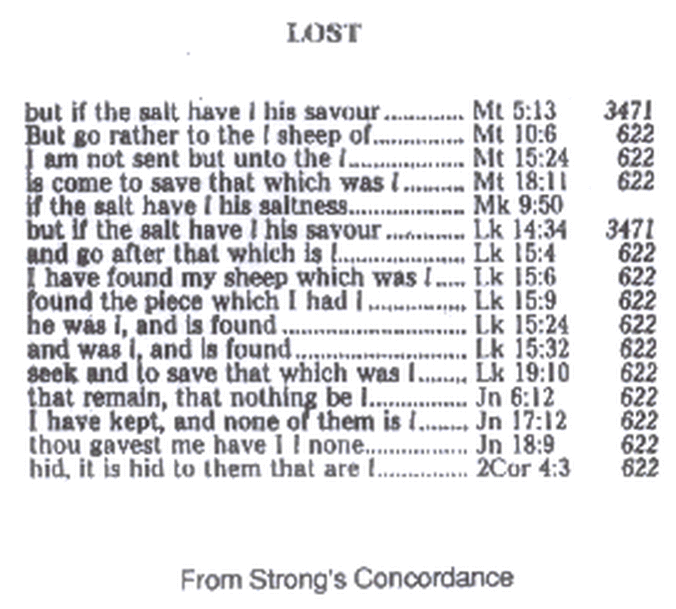

The same word, apollumi (#622 below), is also often translated as 'perish'. In Romans 2:12, "For as many as have sinned without law shall also perish (apollumi) without law:"
In Peter 2:12, "and shall utterly perish (apollumi) in their own corruption."
Matthew 18:14, "So it is not the will of your Father who is in heaven that one of these little ones perish (apollumi)."
And in 2 Thessalonians 2:9-10, "Even him whose coming is after the working of (the carnal mind) with all power and signs and lying wonders, and with all deceivableness of unrighteousness in them that perish (apollumi): because they received not the love of the truth, that they might be saved."
In Peter 2:12, "and shall utterly perish (apollumi) in their own corruption."
Matthew 18:14, "So it is not the will of your Father who is in heaven that one of these little ones perish (apollumi)."
And in 2 Thessalonians 2:9-10, "Even him whose coming is after the working of (the carnal mind) with all power and signs and lying wonders, and with all deceivableness of unrighteousness in them that perish (apollumi): because they received not the love of the truth, that they might be saved."
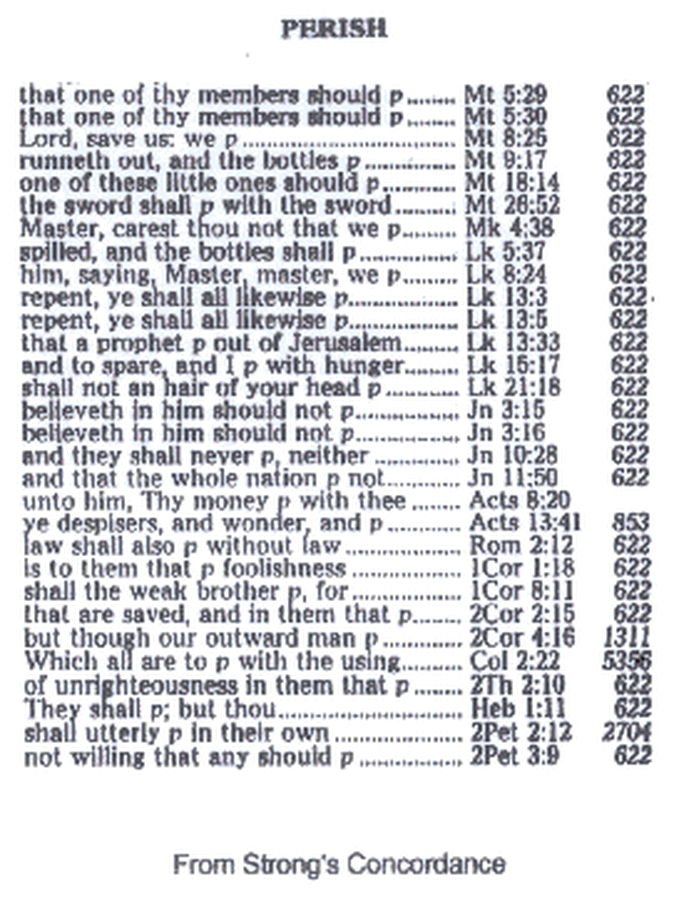
The same word, apollumi is also often translated, 'destroy' and is assumed to mean 'to deprive of life' as in John 10:9-10 where Jesus is speaking,
"I am the door; if anyone enters through Me, he will be saved, and will go in and out and find pasture. The thief comes only to steal and kill and destroy (apollumi); I came that they may have life, and have it abundantly."
Please note that there are three words used to describe
what the thief comes to do: 1) steal, 2) kill, 3) destroy. The word translated 'kill' is the Greek word 'thuo' which means to slay or slaughter, as in slaughtering sacrifices.
Obviously the word 'kill' (thuo) CANNOT mean the
same as the word 'destroy' (apollumi) for two reasons:
1) each word is a different word in the Greek
2) it would be redundant if the word 'destroy' meant to kill, because if it did, the passage would read, "The thief comes only to steal and kill and kill."
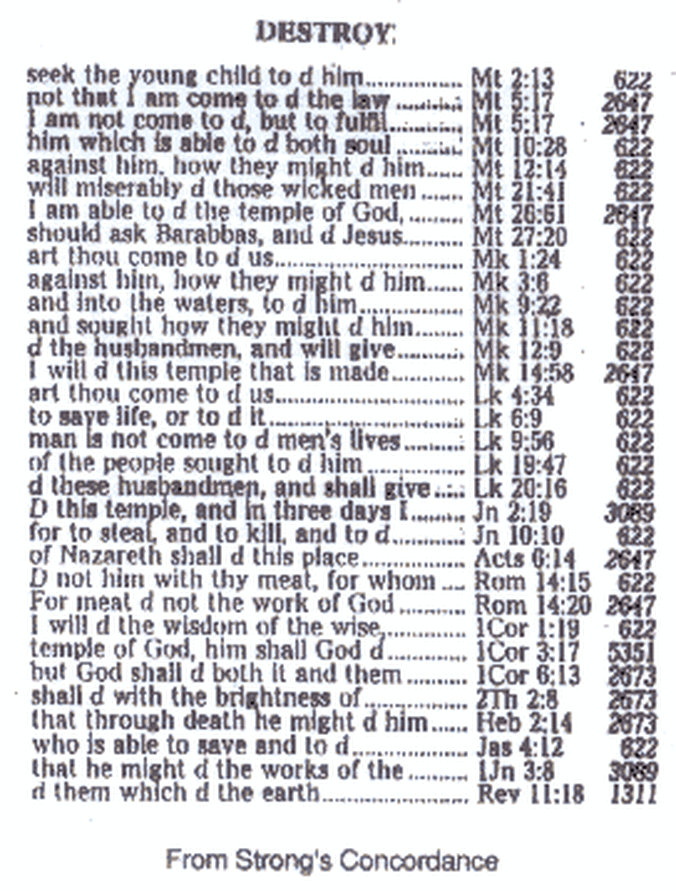
Since the Bible was NOT originally written in English, we must look to the original language of Greek and Hebrew, the original words that God inspired, and let the Bible interpret itself. If we don't, then we are taking the words of man, a translation by committee consensus, as our guide rather than the Divine Word of God.
The proper definition of each word in the Greek is revealed when that specific word, such as apollumi, means the same thing each time it is used. Because the word apollumi is used to define a state of
"having life" (the sheep was "lost" but alive not dead), it CANNOT also be used to define a state that is OPPOSITE of life DEATH, such as what the
theologians would have us believe is meant in Romans 2:12 and 2 Peter 2:12, as shown above.
In other words, one specific word CANNOT mean both a state of life AND a state of death!
It is obvious from these many uses of the word apollumi, that it CANNOT mean "to deprive of life."
Clearly the Bible translators translated these passages according to their own preconceived theological beliefs.

Matthew 2:13 states "And when they were departed, behold, the angel of the Lord appeareth to Joseph in a dream, saying, Arise, and take the young child and his mother, and flee into Egypt, and be thou there until I
bring thee word: for Herod will seek the young child to destroy him." Many have assumed that the word
'destroy' (apollumi in Greek) in Matthew 2:13 must mean 'to deprive of life,' but that definition has no support Biblically.
There are Greek words that mean 'to deprive of life.' They are:
1) apokteinco, which means "to kill;"
2) sphazoo, slay;
3) anaireoco, assassinate or massacre; or
4) phoneuco, which means murder.
bring thee word: for Herod will seek the young child to destroy him." Many have assumed that the word
'destroy' (apollumi in Greek) in Matthew 2:13 must mean 'to deprive of life,' but that definition has no support Biblically.
There are Greek words that mean 'to deprive of life.' They are:
1) apokteinco, which means "to kill;"
2) sphazoo, slay;
3) anaireoco, assassinate or massacre; or
4) phoneuco, which means murder.

Apollumi is used for things which have no life, such as wine skin bottles (Matthew 9:17, Mark 2:22 and Luke 5:37). These bottles do not "die" when they are "destroyed." A reward is not "mortal."
See Matthew 10:42 and Mark 9:41, "Verily I say unto you, he shall in no way lose (apollumi) his reward." And gold and money do not "die." In fact, they never had life. See Luke 15:8 and 1 Peter 1:7, "That the trial of your faith, being more precious than of gold which is perishable (apollumi)." The words which actually do mean 'to deprive of life' could not be used in these passages.
Apollumi is often used to describe something that either remains alive or has never had life. If the lost
(destroyed) sheep (Luke 15:4) had been 'deprived of life', the shepherd would not have rejoiced when he found his carcass. A word whose primary meaning is
"to deprive of life" cannot have a secondary meaning of "continued life." Death cannot be another form of life. White is not another word for black. And life in any form is not expressed by a word which means death.
Jesus said "He who is finding his soul will be destroying (losing) it, and he who destroys (loses) his soul on my account will be finding it" (Matthew 10:39, Mark 8:35,
Luke 9:24, Luke 17:33). Is Jesus urging them to commit suicide? NO! The destruction of the soul does not mean death. It means to dis-assemble or destroy the old
man of sin, to destroy our carnal nature, to realize the new creation we already are in Christ.
See Matthew 10:42 and Mark 9:41, "Verily I say unto you, he shall in no way lose (apollumi) his reward." And gold and money do not "die." In fact, they never had life. See Luke 15:8 and 1 Peter 1:7, "That the trial of your faith, being more precious than of gold which is perishable (apollumi)." The words which actually do mean 'to deprive of life' could not be used in these passages.
Apollumi is often used to describe something that either remains alive or has never had life. If the lost
(destroyed) sheep (Luke 15:4) had been 'deprived of life', the shepherd would not have rejoiced when he found his carcass. A word whose primary meaning is
"to deprive of life" cannot have a secondary meaning of "continued life." Death cannot be another form of life. White is not another word for black. And life in any form is not expressed by a word which means death.
Jesus said "He who is finding his soul will be destroying (losing) it, and he who destroys (loses) his soul on my account will be finding it" (Matthew 10:39, Mark 8:35,
Luke 9:24, Luke 17:33). Is Jesus urging them to commit suicide? NO! The destruction of the soul does not mean death. It means to dis-assemble or destroy the old
man of sin, to destroy our carnal nature, to realize the new creation we already are in Christ.
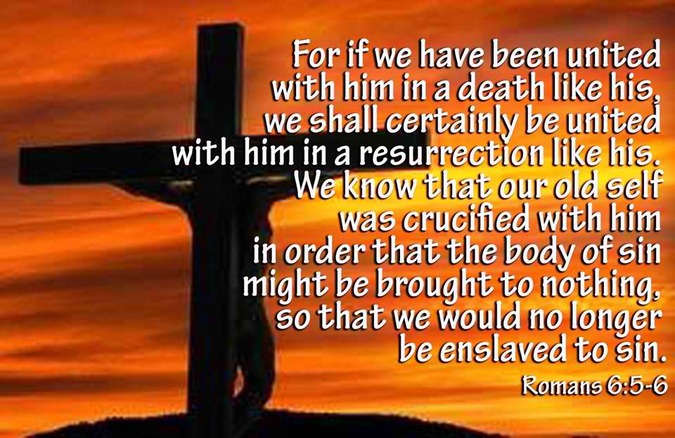
Romans 6:6 describes this process. "Knowing this, that our old man was crucified with Him, that the body of sin might be done away, that so we should no longer be in bondage to sin."
The statement that the "Son of Man came to seek and to save that which is lost (destroyed)" (Luke 19:10) is the key to the meaning of apollumi. This Bible passage refers specifically to Zacchaeus, who was lost (destroyed). Because he was lost (destroyed), he was ready to be found and saved.
The Greek word apollumi is often given an interpretation that means death from which there is no
resurrection, or annihilation, a state from which salvation is impossible. This passage in Luke 19:10 destroys this premise. Instead of the lost being
beyond salvation, they alone are eligible for salvation! It is impossible to rescue a man who is already safe. It is only when he is in a "lost" condition denoted by the word apollumi that salvation can operate in his behalf.
The terms seek and save mean the opposite of destroy. So the one who is 'destroyed', is really just lost, not annihilated or , or no one would seek after him in order to save him. He must be in a state which needs salvation or Christ would not have come to seek and to save him. This passage proves beyond a doubt that 'destruction' is a salvageable condition, not a state beyond the reach of salvation. In addition, please notice that only the "lost" are saved. This fact reverses the usual idea of destruction. God seeks what He has lost!
Destruction is a relative term. The coin was lost (apollumi) in relation to the woman. The sheep was lost (apollumi) in relation to the shepherd. The prodigal son was lost (apollumi) in relation to his father. They were not dead, but they were away from the woman, the shepherd, and the father, respectively. Does this prove that they were outside the sphere of salvation? No, it actually proves the opposite.
Destruction is the prelude to salvation! Destruction
never means annihilation or eternal conscious torment, irrespective of how closely it may seem to
approach that idea in some cases.
The statement that the "Son of Man came to seek and to save that which is lost (destroyed)" (Luke 19:10) is the key to the meaning of apollumi. This Bible passage refers specifically to Zacchaeus, who was lost (destroyed). Because he was lost (destroyed), he was ready to be found and saved.
The Greek word apollumi is often given an interpretation that means death from which there is no
resurrection, or annihilation, a state from which salvation is impossible. This passage in Luke 19:10 destroys this premise. Instead of the lost being
beyond salvation, they alone are eligible for salvation! It is impossible to rescue a man who is already safe. It is only when he is in a "lost" condition denoted by the word apollumi that salvation can operate in his behalf.
The terms seek and save mean the opposite of destroy. So the one who is 'destroyed', is really just lost, not annihilated or , or no one would seek after him in order to save him. He must be in a state which needs salvation or Christ would not have come to seek and to save him. This passage proves beyond a doubt that 'destruction' is a salvageable condition, not a state beyond the reach of salvation. In addition, please notice that only the "lost" are saved. This fact reverses the usual idea of destruction. God seeks what He has lost!
Destruction is a relative term. The coin was lost (apollumi) in relation to the woman. The sheep was lost (apollumi) in relation to the shepherd. The prodigal son was lost (apollumi) in relation to his father. They were not dead, but they were away from the woman, the shepherd, and the father, respectively. Does this prove that they were outside the sphere of salvation? No, it actually proves the opposite.
Destruction is the prelude to salvation! Destruction
never means annihilation or eternal conscious torment, irrespective of how closely it may seem to
approach that idea in some cases.

God is love and ALL of His creatures are precious to Him. God loves all of us equally. It takes 'destruction' for us to feel our need, and it takes 'destruction' to flood us with God's Divine love.
Because men are unable to accomplish all that they wish, they imagine that God also is unable to save ALL
of humanity. This basic error has so warped the minds of men that they have corrupted the Scriptures to
uphold it.
The story of the Potter (Jeremiah 18:1-7) reveals that it is the Potter Himself who crushes the vessel when He discovers it is marred. But the vessel never leaves the Potter's hands during its "destruction" and re-creation into a New Creature.
God does not destroy anything that he cannot completely restore. 'Destruction' is a passing process, not a finished goal. The old sinful nature is destroyed as a prelude to the formation of a New Creature in Christ. Remember God says "Behold I make ALL
things new." Revelation 21:5
Because men are unable to accomplish all that they wish, they imagine that God also is unable to save ALL
of humanity. This basic error has so warped the minds of men that they have corrupted the Scriptures to
uphold it.
The story of the Potter (Jeremiah 18:1-7) reveals that it is the Potter Himself who crushes the vessel when He discovers it is marred. But the vessel never leaves the Potter's hands during its "destruction" and re-creation into a New Creature.
God does not destroy anything that he cannot completely restore. 'Destruction' is a passing process, not a finished goal. The old sinful nature is destroyed as a prelude to the formation of a New Creature in Christ. Remember God says "Behold I make ALL
things new." Revelation 21:5
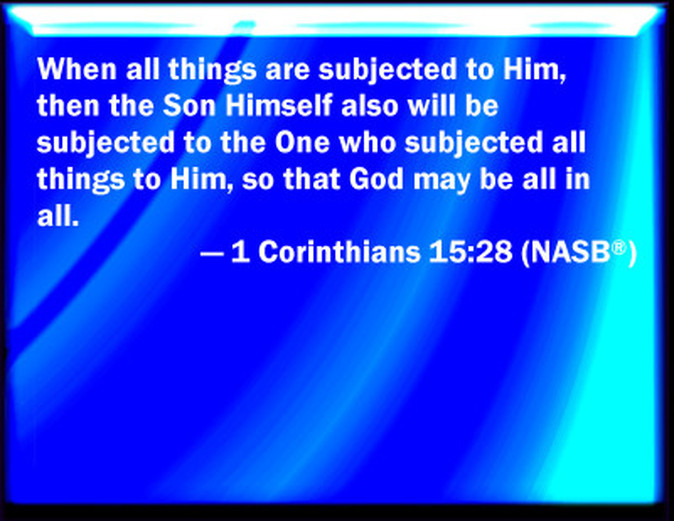
Paul wrote in 1 Corinthians 15:28, "When ALL things are subjected to Him, then the Son Himself also will be subjected to the One who subjected ALL things to Him, so that God may be ALL in ALL."
Paul also wrote in Ephesians 1:9-11, "Having made known to us the mystery of His will, according to His good pleasure which He purposed in Him with a view to an administration suitable to the fullness of the times, that is, the summing up of all things in Christ, things in heaven and things on earth. In Him also we have obtained an inheritance, having been predestined according to His purpose who works ALL things after the counsel of His will.
God is love. Love never fails. God's plan is clearly the restoration of ALL. God is clearly the Savior of ALL (1 Timothy 4:10). None will actually perish, none will actually be destroyed, none will actually be lost.
The grace of God has appeared, bringing salvation to ALL men. Titus 2:11
Thank you Daddy for loving us unconditionally!
portions of this blog are from Lorraine Day, M.D. at http://www.goodnewsaboutgod.com/studies/wicked2.htm
Paul also wrote in Ephesians 1:9-11, "Having made known to us the mystery of His will, according to His good pleasure which He purposed in Him with a view to an administration suitable to the fullness of the times, that is, the summing up of all things in Christ, things in heaven and things on earth. In Him also we have obtained an inheritance, having been predestined according to His purpose who works ALL things after the counsel of His will.
God is love. Love never fails. God's plan is clearly the restoration of ALL. God is clearly the Savior of ALL (1 Timothy 4:10). None will actually perish, none will actually be destroyed, none will actually be lost.
The grace of God has appeared, bringing salvation to ALL men. Titus 2:11
Thank you Daddy for loving us unconditionally!
portions of this blog are from Lorraine Day, M.D. at http://www.goodnewsaboutgod.com/studies/wicked2.htm
 RSS Feed
RSS Feed